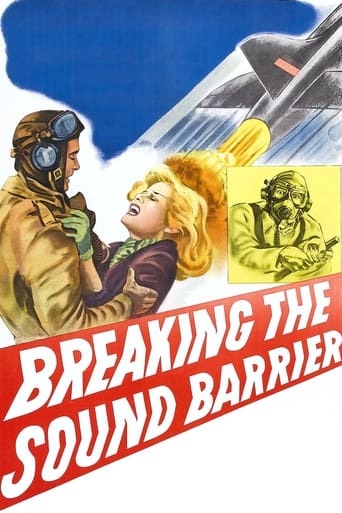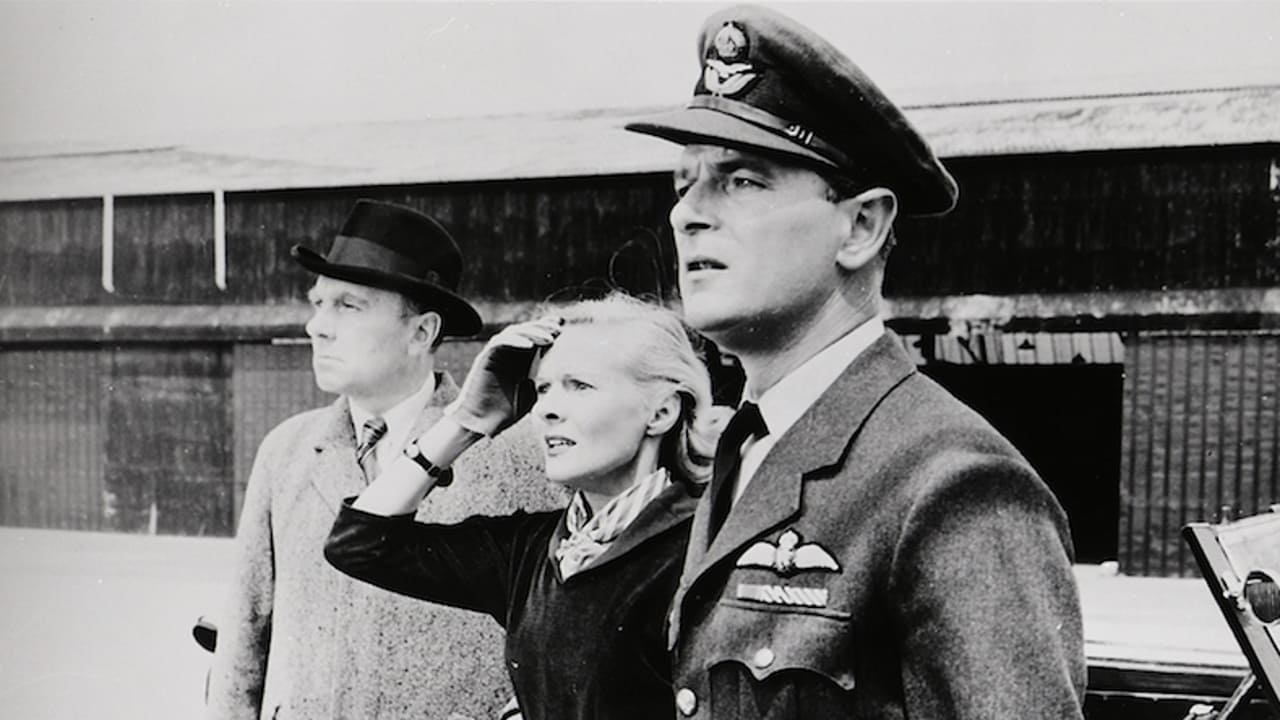lewis-51
This is an impressively made movie from 1952 spanning the years between the end of WW2 and the Sputnik era. In some ways, it is a science fiction movie. It has the right spirit for a classic, "real" sci fi novel or movie, as distinguished from almost all of those produced in the last 25+ years, which are primarily filled with irony, self- deprecating humor, pessimism, decadence, and gratuitous violence. Everyone born since, say, 1965, should see this to get the real spirit of science fiction.As others have posted, it really is fiction. The fact that Chuck Yeager broke the sound barrier in 1947 was kept top-secret for several years. This movie was in the middle of production when the story broke. According to Robert Osborne on TCM, the director and producer considered including a reference to Yeager, but wisely, I think, decided to continue with the original plot and screen play. It is also fictional in the explanation for how to control the plane as it passes Mach 1, but that is a minor point.However, it is also based on fact. The problems and fears about exceeding Mach 1 were very real. Some of the basic characters are clearly modeled on Geoffrey de Havilland, father and son. It would be almost, but not quite, a spoiler to read about them before seeing the movie.The script and acting are excellent. It is very good that they emphasize the tension between the father and daughter. The resolution of that tension is very good indeed.About the only criticism I can make is the choice of the actress to play Susan, the daughter and wife. She seems too old, and in real life, was only seven years younger than her "father." I am very glad that I saw this optimistic, yet realistic, look at the motivation and risks of aeronautic and space exploration, coming from the golden age of British cinema.henry
silverscreen888
By many standards, David Lean's production of the film he directed in 1952, "The Sound Barrier" is both unusual and I suggest rewarding. The screenplay by Terence Rattigan I found to be riveting throughout. This I judge stems from the fact that its subject is men of vision, and what they do to about their greed for something unnameable, necessary and sometimes deadly. The author in the film is at pains not to paint such men as glory hunters, nor seekers after excitement alone; in one scene, the central character talks about the fliers of the past, and then suggests the men of the future will need vision even more than flying skills to conquer what awaits us--and the answer to what that is is given as "the stars"--called the final frontier in this film in all but name. There are three fliers we meet in the film at a fictitious industrial empire called Ridgefield. The boss's son who hasn't got what a flier needs, Tony, who marries his daughter and reaches his limit because he lacks the necessary genius, and Philip, who has "the right stuff". What I find extraordinary about this very well-directed cinematic tale is that it is always about the people and the joy and danger of flight at the same time, without the focus ever losing sight of the people. The music for this film was supplied by Malcolm Arnold, and it is extraordinary almost everywhere but I find never intrusive. One sequence involves one of the three pilots taking his new wife for a swift flight to Cairo from England; the scene accomplishes many things at once. She learns because of her journey, what some men see in the serenity of the sky, and even its danger; it introduces us to the third pilot and his wife; and we are given a sense of the camaraderie of the men who flew in those days; another such moment occurs when the French ace Geoffrey de Havilland is killed trying to break the sound barrier ahead of all others. Jack Hildyard and several others supplied the cinematography and aerial scenes; Elizabeth Hemminges did a fine subdued job on the costumes; Vincent Korda is credited with the Art Department's superb work while Muir Matheson is acknowledged as music director. Among the smallish cast, the pilots are all beautifully played. bright Nigel Patrick is likable ace Tony, young Denholm Elliot stands out as the boss's son, and John Justin is just right as the third of the trio, Philip. Joseph Tomelty is admirable as Will Sparks, the designer tormented by his own part in causing test pilots to risk their lives; Ann Todd is good as the tormented Susan, wife to Tony and daughter of the boss of Ridgefield. Dinah Sheridan is also lovely as Philip's brave wife; but it is Ralph Richardson's powerful realization of John Ridgefield, former pilot, towering presence and inspiring and dangerous leader of men who along with Justin gives the film its unusual dimension of mind and purpose. One may quarrel with the motivations attributed to Richardson in the last scenes; but he has been so alone in his vision and at such a cost, he may be forgiven for asking at last to be understood. The ending I find to be most satisfying, the film's climax tremendously moving. This is a great film, which has never been appreciated as it should have been. It is B/W film-making at its dramatic best for my money. Its science may not be perfect, but its depiction of human merit and what happens when that quality is lacking in a man is powerful indeed. Not to be missed.
Robert J. Maxwell
You can't help comparing this to "The Right Stuff," particularly the sections that deal with Chuck Yeager's exploits. This movie stands up at least as well as the more expensive epic based on Tom Wolf's book, although "Breaking the Sound Barrier" is in black and white, virtually without special effects, and characterized not by arguments and competition, but by stiff upper-lipness and British taciturnity.Ralph Richardson plays the head of an aircraft manufacturing empire. His effete but game son feels compelled to become a flier because that's what the rigid Richardson seems to expect of him. End of son, played by a surprisingly undebauched looking Denholm Elliot.Richardson has a daughter too, Ann Todd. She marries a test pilot, Nigel Patrick, "not of your level," who is given a job flying new jets for Richardson's company. She wants them and their baby to have their own place and leave Richardson's house. "You must have noticed the distance between father and me," she confesses. "He's always resented me for not being a son." Patrick hasn't noticed. And at least one viewer (ie., me) had to think over earlier scenes to pick up on the hints. The Brits are like American Southerners, adept at reading others' emotional states from the smallest indications, and women are better at it than men.The director and writer -- David Lean and Terrence Rattigan -- pull a fast one on us two thirds of the way through. Owing nothing to Hitchcock's "Psycho" they kill off the protagonist and leave us gaping , the way Patrick leaves an untidy hole gaping in what appears to be an astonishingly tidy farm field, a bit of smoking wreckage scattered about.Patrick's friend and fellow pilot takes over the final mission to crack the sound barrier. The solution to the problem is too simple to be taken seriously but at any rate the pilot survives. An hour later, alone in a room, he begins giggling hysterically and turns to sobbing. Ya'd never see somethin' like that in an American movie like "The Right Stuff." Sobbin' is fer wimmin.But at least Richardson's humanity and horror and anguish are revealed when his daughter visits him more or less by accident. The final test is in progress and the radio transmissions are being piped into Richardson's office. "Forty-seven thousand now," says the pilot. "I'm taking her down for a final run." Richardson and Todd have had a brief argument and she is about to storm out when he begs her, "Please don't go! Don't leave me alone!" The human feeta clay after all.I want to emphasize that there are some novel techniques on view here. In 1950, when this was shot, jet propulsion was still something of a novelty. People didn't know what made jet engines go, and they had never heard of a sound barrier. So it comes as a surprise when we see a tiny object in the distance. It is a jet plane and is speeding towards us. But -- there is no SOUND. Its image looms larger on the screen until it is almost overhead and then -- WHOOSH. And we can figure out that there is no noise ahead of the aircraft because it is traveling almost as fast as the noise itself.There are two plane crashes. In any modern action flick they call for an enormous fireball of an explosion. But not here. One airplane, a fragile biplane, tumbles to earth and comes to rest tail up, seemingly in pretty good shape. The camera stays at a distance as people rush across the field towards the wreck. Then we see a wisp of oily smoke. Then billows of it, and then flame, and we realize that the pilot we thought was safe is now doomed. And Lean cuts from the other pilot to a distant office just before the crash. We not only don't see the crash. We don't even hear it.There's something else worth mentioning too. "The Right Stuff" at some moments gives us the excitement and the danger of flying but never the exhilarating joy of slipping around noisily in three dimensions. The first opening minutes of "Breaking the Sound Barrier" show us a Spitfire over Dover with a youthful pilot doing aerobatics, and the actor, the director, and the composer let us know exactly how he feels.Very good movie.
george7096
I saw "The Sound Barrier" in 1952 and it had a great impact on this young moviegoer. The opening sequence on an abandoned air base and the theme music have stayed with me for 50 years. Apparently this film is not available in the USA at present, but I hope it will return to our shores. The technical side of the movie may be less relevant now, when men and women fly far beyond the speed of sound and far beyond the earth's atmosphere. But the story of the characters is what I remember best: the closeness of the small band of test pilots and their loved ones, how they are inspired by the promise of supersonic flight, and how they react when things go wrong.


 AD
AD


